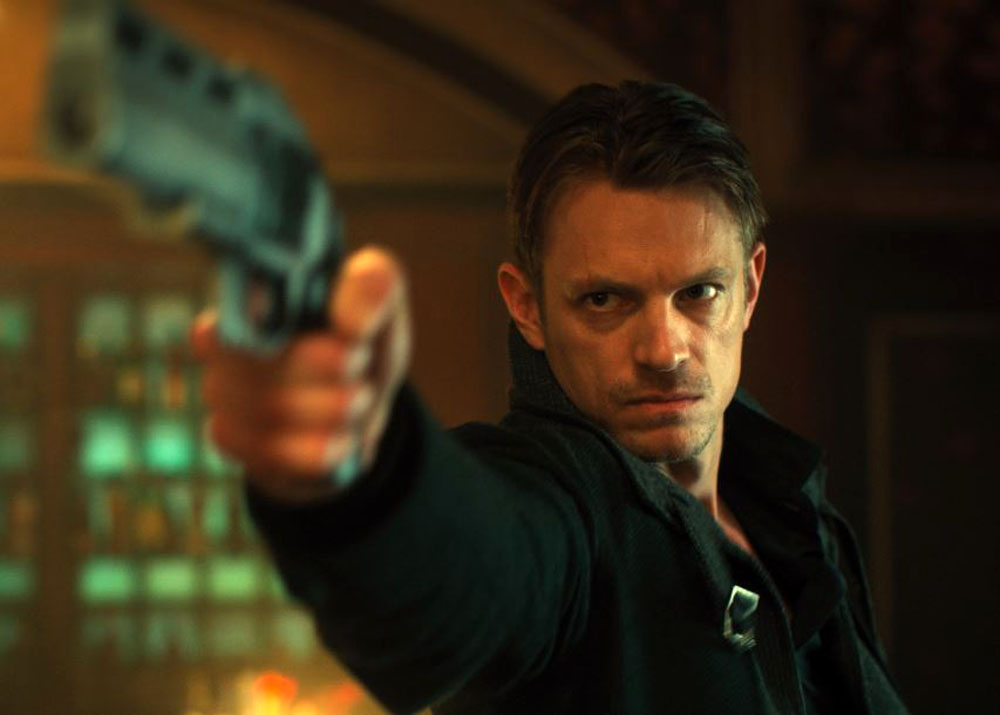Altered Carbon (Season One Review, Netflix, 2018)

… is a very, very cool and original science fiction series about a world where death no longer exists, and the main value has become the immortality of the soul, not the shell - digital immortality.
On the Earth of the XXV century, there are still the poor and the rich, only the rich, thanks to downloading and copying of consciousness, can live almost forever, and the poor - well, that's how lucky you are. Criminals are deprived of bodies and stored on "hard drives", investigators interrogate suspects in virtual reality, and the minds of deceased people are resurrected to find out the circumstances of death (if they are not neo-Catholics who have encoded their cervical disc from resurrection). This is the world of new moral coordinates, the world of digital post-humanism.

The story begins with Special Forces soldiers of the United Star Systems Government finding and killing the last of the terrorist militia leaders who fought an elite-based regime based on the immortality of the elite. The tough and silent yakuza Takeshi Kovacs, the last of the Emissaries, plunges into stasis - and wakes up in a new body 250 years later to find out that his release was lobbied by one of the richest and oldest people in the world to be hired as a private detective. And the crime is this: someone killed this millionaire almost immediately after the backup of consciousness and he does not remember two days before his death. He does not believe in his own suicide, he also trusts his wife completely. The reward for a solved case is money, freedom and amnesty; so, gritting his teeth and getting used to the new face in the mirror, Takeshi Kovacs puts on his cloak and begins to investigate.
***
Cool trans-humanistic fiction, stylized as a mixture of noir and cyberpunk in an interesting proportion.
An original and, in its own way, pretentious world with its own rules and conditions of the game, the past of the heroes of which is revealed step by step, while maintaining the intrigue. Each hero has his own simple but effective type, character and logic of actions, starting with the main on-screen couple, a gloomy detective with the skills of an intellectual commando and a risky beauty-truth-teller from a corrupt police department, and ending with minor characters like a cunning program-owner of a hotel with Edgar Allan Poe's appearance or the exotic appearance of a female fighter with an unexpected backstory that turns everything upside down. The plot is very interesting to follow, despite its initially seeming confusion and an unusual approach to the narrative, when, due to the peculiarities of the described world, the same character can be played by actors not only of different appearance, but also of different genders. With all its tension, fantasy and unpredictability, when you worry about the heroes even though they can only die from damage to the device-carrier in the neck area - "Altered Carbon" makes you think about what makes us human - bodies that we (for now) cannot change much, or what is inside? What makes up our personality, life experience? How will the very essence of life change if there is a reliable and secure way to store all information about a person's personality on a small device that can live longer than the physical shell? Which one can be copied? Or hack? ..

This is a very important and interesting problem that one day we will have to face if we want to become something more than just another species of animals that has disappeared from the face of the earth. As far as we know, we humans are the first intelligent beings on the planet to have come such a long way, from stone tools to interplanetary rockets. The taming of the magical elements of fire, steam and electricity were turning points that accelerated our development. Who knows, maybe somewhere very close on the horizon another industrial revolution awaits us, connected, for example, with artificial intelligence and neural networks, which will allow us to cure cancer and AIDS, understand the connection between the quantum and atomic world, find a theory of everything and master travel between stars faster than thousands of years? Digital immortality as a side effect of technological progress in this series looks quite plausible.
Should you watch Altered Carbon? First season - oh yeah.
This is a creatively shot, well-directed, very beautiful ten-part film with a rich visual range and convincing special effects, shot without the censorship restrictions usual for mass, teen-oriented cinema. Altered Carbon, like Space, Stranger Things or Game of Thrones, is yet another triumph for the era of Netflix and streaming, when Internet platforms and cable TV allow for projects that would be impossible to imagine in conventional cinema with its limitations. Cinema in a multiplex is a short story, gripping and beautiful at best, but short and often superficial, if it's not a festival art house or a new classic. TV series and, in a rare but pleasant, case, games, is a novel that can be built as complexly as its authors want (as, for example, happened in the second season of Westworld, overcomplicated and confusing the viewer with the first seven- eight episodes). The episodes-chapters of the series are very close to the book style of plotting and allow you to reveal the characters in a way that one film cannot (but it also depends on the talent of the scriptwriters, of course).

Does this mean Altered Carbon has no downsides? Unfortunately no. He has a perfectly twisted intrigue, competent final chords of the episodes (finding a balance between the feeling of the danger threatening the heroes and the risk of disappointing the viewer who is ready, if anything, to ask "Oh gods, and why did I watch all this ?!" is a difficult task), but the line the main antagonist can raise very, very many questions. Perhaps in the book on which the first season of the series is based, this is better revealed, or my wife and I did not fully understand this, but the motivation of the main antagonist of "Altered Carbon" looks very tense and, let's say, pathological (you can draw an analogy with the ending of the last the season of "Sherlock", where the best moment was Moriarty's return to the music of Queen, the first ten seconds before the credits). Perhaps, if history had devoted a little more time to the antagonist and, for example, showed some of the events through his eyes, it would have been easier to empathize with him, but now this is not working at all. The villain works as a function - it fits into the plot of the plot in a very interesting way, logically follows from it, but it is a function. This is not a character, in its role - a cliché, he lacks persuasiveness. There is drama, oh yes, and there is also a connection with the main character. But an effort must be made to understand his motives. Great effort.
As for the rest, everything is very interesting, atmospheric, unusual and unpredictable, shot fresh and stylish, the picture is excellent, you want to worry about the characters. My wife and I liked it, we are waiting for the second season - I wonder what its main story will be and what the main character will come to now that everything is over and he had to do what he did.


Comments